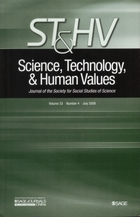
KONOPÁSEK, Z. / STÖCKELOVÁ, T. / ZAMYKALOVÁ, L. (2008): Making pure science and pure politics: On the expertise of bypass and the bypass of expertise. Science, Technology & Human Values, 33 (4): 529-553
::::This paper is based on a case study of a long-term public controversy over the construction of a highway bypass (around Plzen, Czech Republic). Two principal variants of the bypass were proposed. One of them began gradually to appear preferable, increasingly attractive for experts, but remaining only on paper. In the meantime, however, the other variant became more realistic, pushed through mainly by local politicians and actually constructed. We show how purification of science from politics (and vice versa) played a key role in the development and ending of the case. Initial expertisation of the case switched to its sharp politicization, when people got frustrated from protraction and indecisive evidence of accumulated expertise. This turned to be fatal for those who consistently staked everything on "pure facts". We conclude by outlining some general consequences of such a development for both democratic decision making and the political relevance of expertise.
KONOPÁSEK, Z. (2008): Expertíza a politika životního prostředí: Případ projektu Natura 2000. CTS Research Reports, CTS-08-02. Praha: CTS. Dostupné na adrese http://www.cts.cuni.cz
::::As sociologists interested in the relationships between expert knowledge and policy making we have studied in detail the processes of implementation of European directives on natural habitats, wild fauna and flora (92/43/EEC) nad on conservation of wild birds (79/409/EEC) in the Czech republic - i.e., the preparation and implemenation of so called Natura 2000. We have focused on diverse practices of expert mapping of the Czech nature, on how national lists of Sites of Community Importance were produced and on how the preparation of these lists was consulted with the public. We also observed how Natura 2000 was shaped by various actors in various ways, so that it could be connected to various plans, projects and trajectories (beyond the plan of Natura 2000 itself). As a result, a number of compromises were incorporated into the project - compromises which were often regarded as problematic, but which, at the same time, made Natura 2000 an object that could be reasonably shared (and supported) by environmentalists, naturalists, policy makers, activists and scientists from various fields. In comparison to, e.g., France, the implementation of Natura 2000 in the Czech Republic passed through smoothly, without major political controversies and as originally intended, i.e., as an exclusively expert driven project. To explain this we offer some insights into different political cultures in the Czech Republic and Western Europe, including specific contexts of the Czech accession process to the EU and its impact on political culture. Our close study of how the Czech nature was mapped and how so called national lists were established reveals that these processes were not completely apolitical and purely expert-driven. We have described a number of particular interests, political calculations, EU-related concerns, organisational contexts etc. intervening into the seemingly purely scientific methods and viewpoints. However, we have also shown that these non-scientific elements often did not work against the scientific quality of the project, but rather reinforced it. For instance, some administrative interventions strengthened the quality of scientific data - as their unintended by-product. Thus, we now better and more realistically understand what it means when we say that a project is purely expert-driven. It means usually something slightly different than to proceed strictly apolitically, but on the other hand it does not mean that expert perspectives are made secondary or even irrelevant.
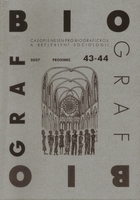
WATERTON, C. (2007): Od terénu k představám: Klasifikace přírody a vytváření Evropy. Biograf , (43-44): 3-32 - přeložil Zdeněk Konopásek
, (43-44): 3-32 - přeložil Zdeněk Konopásek
::::This paper sets out some observations on the making, and use, of contemporary classifications of nature in the context of a simultaneous and on-going "making" of Europe. It looks in particular at two classifications, one of British vegetation communities and the other of European "biotopes" (a concept that closely relates to natural or semi-natural "habitats") – respectively, the UK National Vegetation Classification (NVC) and the EU CORINE Biotopes Classification. It investigates aspects of the relationship between these two classifications which has come about through their use in a European conservation policy. The CORINE Biotopes classification, in particular, represents a new ordering of nature in a very active sense: it is a good example of a "working archive", and is intimately tied into policy decisions at many levels in Europe. The paper addresses questions as to how contemporary classifications are being made and used, and whether certain tacit understandings and conceptual frameworks "built in" to them reflect back upon the world at a later stage. It argues that these classifications do not always simply reflect the assumptions and understandings built into them: once in the policy domain, they are not as "reversible" as that. Their categories quickly become unstable, mutating and interacting in sometimes unpredictable ways. The two classifications, through their relationship with policy, have a jointly evolving history. The continual renewal of meaning attached to classes within these classifications appears to reflect outwards rather than inwards – in chorus with the broader social and political context, rather than reflecting the condition of their making. In their evolving forms, they illustrate very well the complex nature of the dynamic between unity and diversity, centre and periphery, that lies at the heart of the European Union.
Přeloženo z originálu WATERTON, C. (2002): From field to fantasy: Classifying nature, constructing Europe. Social Studies of Science, 32 (2): 177-204
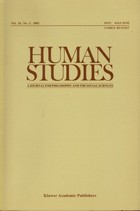
KONOPÁSEK, Z. / KUSÁ, Z. (2006): Political screenings as trials of strength: Making the communist power/lessness real. Human Studies, 29 (3): 341-362
::::In this paper we discuss the problem of communist power in so called totalitarian regimes. Inspired by strategies of explanation in contemporary science studies and by the ethnomethodological conception of social order, we suggest that the power of communists is not to be taken as an unproblematic source of explanation; rather, we take this power as something that is itself in need of being explained. We study personal narratives on political screenings that took place in Czechoslovakia in 1970 and analyze how the power of communists obtained its strength from ordinary and “unremarkable” interactions between participants. The screenings are interpreted, in the terms of Bruno Latour, as “trials of strength.” We show that it was crucial for all the participants that associations, translations or mobilizations involved in making the regime real, remained partial and multiple, and not exclusive and “total” as is often assumed within dominant discourses on totalitarianism.
KONOPÁSEK, Z. (2005): Exploring ordinary resources of an extraordinary power: Toward ethnomethodological study of the communist regime CTS Research Reports, CTS-05-07. Praha: CTS. Dostupné na adrese http://www.cts.cuni.cz
::::Příspěvek připravený jako zvaná plenární přednáška na konferenci Mezinárodního institutu pro etnometodologii a konverzační analýzu (IIEMCA), Bentley College, Waltham, MA, USA, 6.-9. srpna 2005
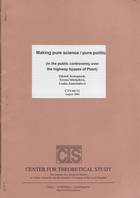
KONOPÁSEK, Z. / STÖCKELOVÁ, T. / ZAMYKALOVÁ, L. (2004): Making pure science / pure politics in the public controversy over the highway bypass of Plzeň CTS. Research Reports, CTS-04-12. Praha: CTS. Dostupné na adrese http://www.cts.cuni.cz/
::::Paper prepared for the Joint 4S & EASST Conference 2004 Public proofs – science, technology and democracy, Paris, Ecole des Mines, August 25-28 2004
This paper is based on a detailed empirical case study of a long-term public controversy over the construction of a highway bypass around the city of Plzen (in South-Western Bohemia, Czech Republic). The controversy involved a wide range of actors: local activists, an environmentalist NGO, politicians of all levels, experts, developers, state and regional administration, and media people. Two variants of the bypass were at stake: one of them gradually appearing better and better, attractive for experts, but existing as if only on paper, while the other was becoming more and more real, pushed through mainly by local politicians, and actually constructed. Although the story could be narrated in terms of an unequal struggle between environmentalists and small villages on one side and politicians, economic lobbies and municipality of a big city on the other, we will try to follow a more subtle and complex story-line, which focuses upon different strategic usages of science and politics. Besides explaining how it happened that one of the variants “attracted” the winning properties (and “won”), we will also describe a “vicious” circle of a double purification of science and politics and show how it contributes to the fragility of both democracy and expertise.
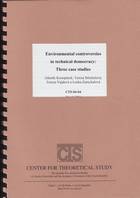
KONOPÁSEK, Z. / STÖCKELOVÁ, T. / VAJDOVÁ, T. / ZAMYKALOVÁ, L. (2004): Environmental controversies in technical democracy: Three case studies. CTS Research Reports, CTS-04-04. Praha: CTS. Dostupné na adrese http://www.cts.cuni.cz/
::::In this research report we present a collection of three case studies that have been undertaken within our work on the research project "Analysing public accountability procedures in contemporary European contexts". The overall aim of the project was to study opportunities and limits of democracy in societies in which expert knowledge becomes crucial for almost any decision-making and socio-technical networks that shape our daily lives are being openly and widely contested in the public arena. Especially in cases where science and technology are involved and where technicalities of different sorts and specialised knowledge penetrate political agenda, i.e., on the borderline of science and politics, the principles of open, friendly, inclusive and transparent politics (as well as the classical principles of disinterested and independent expertise) get into troubles. That is why we decided, in our research, to confront the principle of public accountability with the flesh-and-blood reality of the following socio-technical controversies, elaborated as in-depth case studies: (1) The controversy over the building and operation of the household waste incinerator in Praha-Malesice; (2) The public conflicts concerning the highway by-pass around the city of Plzeň; (3) Current policies and controversies related to the introduction of GMO into the Czech legal, social, economic and political environment.
KONOPÁSEK, Z. / KUSÁ, Z. / STOCKELOVÁ, T. / VAJDOVÁ, Z. / ZAMYKALOVÁ (2002): Czech Republic - a national profile. Research report of the Public Accountability European Research Project, CT2001-00076. Praha. Dostupné na adrese http://zdenek.konopasek.net/docs/WP1_Czech.pdf
::::
KONOPÁSEK, Z. (2002): Dejme smysl volební neúčasti. MF Dnes. 7. června, str. A/9. Rukopis dostupný na adrese http://zdenek.konopasek.net/archiv/texty/neucast.htm
::::
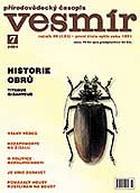
KONOPÁSEK, Z. (2001): O politice nepolitičnosti (ve stopách Bruno Latoura). Vesmír, 80 (7): 386-389
:::: 
 ? - recenze vyjde v časopise Biograf
? - recenze vyjde v časopise Biograf
 se objevily informace o tom, co lze snad prý během března čekat v nové, sedmé verzi mého oblíbeného analytického programu
se objevily informace o tom, co lze snad prý během března čekat v nové, sedmé verzi mého oblíbeného analytického programu





